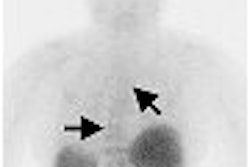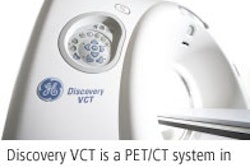ORLANDO, FL - The National Oncologic PET Registry (NOPR), which debuted last year at the annual Academy of Molecular Imaging (AMI) scientific meeting, holds the promise of broadening the scope of the types of oncologic PET scans that can be conducted on Medicare patients. Under the proposed guidelines, PET studies conducted through the NOPR can be reimbursed for all cancers and indications, with the exception of breast cancer diagnosis and axillary staging and melanoma regional nodal staging.
The good news, from a technical and logistical standpoint, is that the NOPR is ready for implementation. The bad news, from a patient advocacy viewpoint, is that the NOPR still has to clear some administrative requirements, according to Dr. Barry Siegel from the Mallinckrodt Institute of Radiology in St. Louis.
Siegel, co-chair of the NOPR Working Group, presented an update on the status of the project to attendees of the 2006 AMI meeting on Sunday. The NOPR is sponsored by the AMI, managed by the American College of Radiology (ACR) and the ACR Imaging Network (ACRIN), and is endorsed by the American Society of Clinical Oncology (ASCO) and the Society of Nuclear Medicine (SNM). Advising on the project is the Centers for Medicare and Medicaid Services (CMS).
Essentially, what the NOPR proposes to do is provide provisional coverage for PET for various new indications, including cervical, brain, pancreatic, ovarian, and testicular cancers, with permanent coverage pending results of clinical investigations and evaluation of the data registry.
The registry plan requires each PET facility to apply for participation in the project. The cost is $50 for the application, with a per-patient fee of $50 for processing their data into the registry. Any PET facility approved to bill CMS for either technical or global charges can participate in the NOPR. Siegel said that approximately 550 PET centers have signed up to participate in the NOPR, and escrow accounts have been opened for those facilities that have elected to provide patient processing fees in advance.
The objectives of the NOPR are to "assess the effect of PET on referring physicians' plans of intended patient management across a wide spectrum of cancer indications that are currently not covered by the Medicare program, and in relation to cancer type, indication, performance status, physician's role in management, and type of PET," Siegel said.
"The goal is to acquire data that can be used to evaluate PET in a manner that does not interfere with patient clinical care and minimizes the burden to the patient, PET center, and referring physician," he said.
The data, which will be collected by the ACR and owned by the AMI as an agent of CMS, will be analyzed by cancer type and indication. For the most frequent cancer indications, interim analysis will be performed at the 200-patient mark to refine sample-size estimates, according to Siegel.
If the frequency of change in intended management for a particular cancer indication is sufficient to suggest benefit, that data, as well as a summary of peer-reviewed published literature, will be provided to the CMS with a request for coverage, he said.
"The eventual goal is to achieve broad coverage through analysis of data across all cancers and indications," Siegel said.
Patients who are eligible for inclusion in the NOPR are Medicare beneficiaries, including those with Medicare HMO coverage who are referred for FDG-PET for almost all oncologic indications not currently reimbursable under Medicare. Non-Medicare, Medicare secondary, and Medicaid patients are currently ineligible for participation in the NOPR.
The PET facility is responsible for collecting and entering data through the NOPR Web site. The requirements are that a patient must be registered within 14 days of the PET scan date, a pre-PET form must be entered by midnight of the PET scan date, and a pre-PET report and post-PET report (from the referring physician) must be entered within 30 days of service.
Referring physicians are responsible for two tasks in NOPR: a pre- and post-PET report. The pre-PET report form consists of five questions, and the post-PET report form has between three and six questions. The forms are available through the NOPR Web site at www.cancerpetregistry.org.
HIPAA compliance with the project is conducted through an executed business associate agreement (BAA) between the PET facility and the NOPR, Siegel said.
Although the mechanisms and processes are in place for data collection and analysis, the NOPR project has to satisfy some final administrative responsibilities. The Health and Human Services (HHS) Office for Human Research Protections (OHRP) is in the process of determining the need for institutional review board (IRB) approval and patient informed consent requirements prior to the NOPR implementation. The groups are scheduled to meet early this week in an effort to reach an agreement that will satisfy IRB and informed consent guidelines for the OHRP, according to Siegel.
"I didn't plan on spending 16 months trying to set this (NOPR) up, but I'm going to stick with it and see it through," he said.
By Jonathan S. Batchelor
AuntMinnie.com staff writer
March 27, 2006
Related Reading
CMS, NOPR to collect PET data, February 10, 2006
CMS provides details on new PET coverage, April 8, 2005
PET registry previewed at AMI, March 21, 2005
AMI, ACRIN partner on PET registry development, February 7, 2005
Medicare expands PET coverage for cervical cancer, January 31, 2005
Copyright © 2006 AuntMinnie.com



















